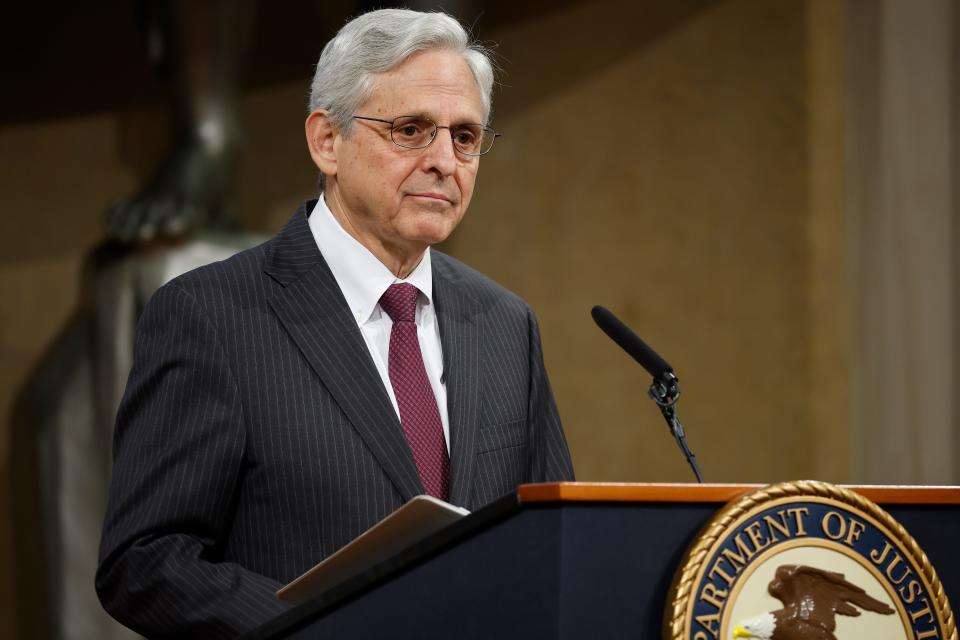Delayed response in Uvalde school shooting faces Justice Department review
WASHINGTON – The Justice Department announced Sunday that it is reviewing the delayed police response to the school shooting in Uvalde, Texas, that left 19 children and two teachers dead in one of the worst campus attacks in U.S. history.
The federal action was requested by Uvalde Mayor Don McLaughlin, Justice Department spokesman Anthony Coley said.
“The goal of the review is to provide an independent account of law enforcement actions and responses that day, and to identify lessons learned and best practices to help first responders prepare for and respond to active shooter events," Coley said, adding that the evaluation will led by the department's Office of Community Oriented Policing.
“As with prior Justice Department after-action reviews of mass shootings and other critical incidents, this assessment will be fair, transparent and independent. The Justice Department will publish a report with its findings at the conclusion of its review.”

Delays amid 911 calls for help from students
Last week, state police officials outlined a damning account of law enforcement inaction in which authorities waited more than an hour before storming adjoining classrooms at Robb Elementary School to take out the 18-year-old gunman, even as children made repeated 911 calls pleading for help.
INNOCENTS LOST: Uvalde attack leaves broken lives, fractured public trust in law enforcement
79 MINUTES OF DELAY: 'It was the wrong decision.' For 79 minutes, police failed to act as children died at Uvalde school
Texas Department of Public Safety chief Steven McCraw said the local school district's police chief, serving as the on-scene commander, waited on reinforcements because he believed the shooter represented no further threat, a decision that may have cost more young lives.
The breakdown immediately recalled past missteps by law enforcement that have haunted responses to similar deadly attacks.
"With the benefit of hindsight, of course, it was the wrong decision," a shaken McCraw told reporters Friday. He said an investigation would try to determine how many died while 19 officers waited outside the locked classroom doors where the gunman continued shooting. "There is no excuse for that."
McCraw has said that the first officers entered the school just two minutes after the shooter slipped through an open side door and began his attack at 11:33 a.m. By about 11:51 a.m., McCraw said, 19 officers were in an outside hallway when the school district police chief decided to not pursue the shooter.
That decision is now at the heart of criticism, along with investigations by local, state and federal law enforcement agencies. McCraw said the chief believed the gunman had barricaded himself in the classroom and the threat had passed.
At the same time, a barrage of 911 calls from students, beginning at 12:03 p.m., was telling a more desperate story as one caller whispered their location to the dispatcher. And in a series of 911 contacts just before police breached the door at 12:50 p.m., McCraw said, the caller said: "Please send police now!"
The acknowledged lapse in time represented a departure from long-standing law enforcement strategy developed after the deadly 1999 Columbine High School shooting in Colorado. The latest protocols direct first responders to immediately confront active shooters to prevent loss of life.

Garland: 'Unspeakable act of violence'
In a commencement address Sunday at Harvard University, Attorney General Merrick Garland paused to recognize the "unspeakable act of violence has devastated families and an entire community."
"I know I speak for all of us here that our hearts are broken."
The attorney general also referred to the mass shootings earlier this month in Laguna Woods, California, and Buffalo, New York, just before the Texas attack.
EXTREMIST VIOLENCE: Buffalo attack highlights most lethal domestic threat: Racist, extremist violence
Justice Department officials are investigating the mass shooting in Buffalo, where 10 people were killed, as a hate crime after it was disclosed that the 18-year-old attacker had allegedly targeted Black people.
This article originally appeared on USA TODAY: DOJ will review delayed police response to Uvalde school shooting
